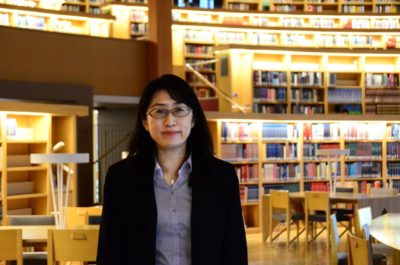 Assistant Professor, Faculty of International Liberal Arts, Basic Education, Social Science, Akita International University
Assistant Professor, Faculty of International Liberal Arts, Basic Education, Social Science, Akita International University
I was able to pursue my research questions, which shifted over time, literally 24/7. It was a true luxury – well, that of a researcher’s kind.
Professor Omori was a Doctoral Fellow during the academic year of 2006/2007. She stayed in Tokyo for the year to conduct research on Roman Catholicism in contemporary Japan, but she also visited Nagasaki Prefecture, including the Gotō Islands, as well as some of the cities in the Tohoku area.
As I take cultural anthropological approaches in my work, conducting long-term on-site fieldwork is essential. Starting in September 2006, I was able to conduct intensive ethnographic fieldwork in Tokyo. I was able to collect data not only from public spheres such as parish churches and the meetings of different movements, but also from lay people’s family masses and other private gatherings. As a result, I was able to explore both the inner core and the fringe of lay Catholic communities in Tokyo. I was also able to visit Catholics in Kyushu Islands and Tohoku areas, and this has added to my understanding of the different constructions of Roman Catholicism outside Tokyo. Some of the places I visited in Nagasaki were later awarded a World Heritage Site status for their relationship to historical “hidden Christians” (kakure kirishitan) in Japan.
I cannot imagine how I could have done my ethnographic fieldwork for twelve months in Tokyo without generous support of the fellowship. I was able to pursue my research questions, which shifted over time, literally 24/7. It was a true luxury – well, that of a researcher’s kind.
The fellowship grants scholars the crucial opportunity of conducting in-person field research. Often, it could be a casual conversation with the locals that sparks a big idea.
There are many memorable moments in my twelve months as a Fellow. I still remember talking to lay Catholic people in Nagasaki who were descendants of residents persecuted for their Christian faith. One of them narrated his ancestor’s story of persecution from the distant past, describing the number of people in the same prison room as if that was his own experience.
Sitting in a “Catholic bar” in Kabukicho (Tokyo), I was intrigued by the idea of having a beer imported from Palestine. There, the “master” of the bar articulated what I was thinking for a long time about the inner changes people undergo by becoming Roman Catholic in Tokyo. Eureka! Through this conversation, I became certain that my research question was answered. That was a fantastic moment. Sadly, this bar was closed after I left the field.
The fellowship opened doors for Professor Omori and helped her establish critical relationships with other scholars. Her book, which contains material gathered during her fellowship, is now available.
As I was awarded the fellowship in my early career as a Ph.D. candidate, the impact of the fellowship was manifold and substantial. I am sure it had positive effects on the later attempts that I made professionally.
In addition to allowing me to conduct independent and intense fieldwork, this prestigious fellowship aided me in establishing trusted relationships among local scholars. It also provided me with the opportunity to collect the material for my first book. I’m delighted to report that my book, From Situated Selves to the Self: Conversion and Personhood among Roman Catholics in Tokyo (SUNY Press, 2020), is now published. This ethnography is the result of my fieldwork conducted as a Japan Foundation Fellow.
As I was awarded the fellowship in my early career as a Ph.D. candidate, the impact of the fellowship was manifold and substantial. I am sure it had positive effects on the later attempts that I made professionally. I was able to procure funding for my postdoctoral research as well as to obtain my current appointment as an assistant professor.
As postdoctoral research, I conducted another ethnographic fieldwork among child welfare practitioners in Tokyo. I also continued my work on the second-generation Japanese Canadians, publishing a few articles.

